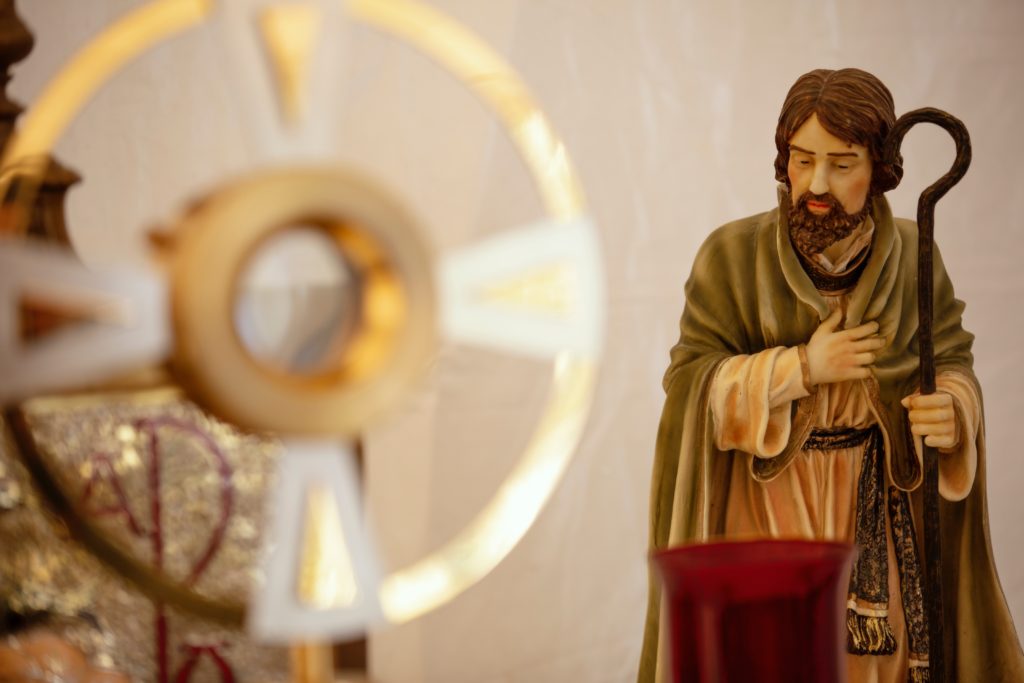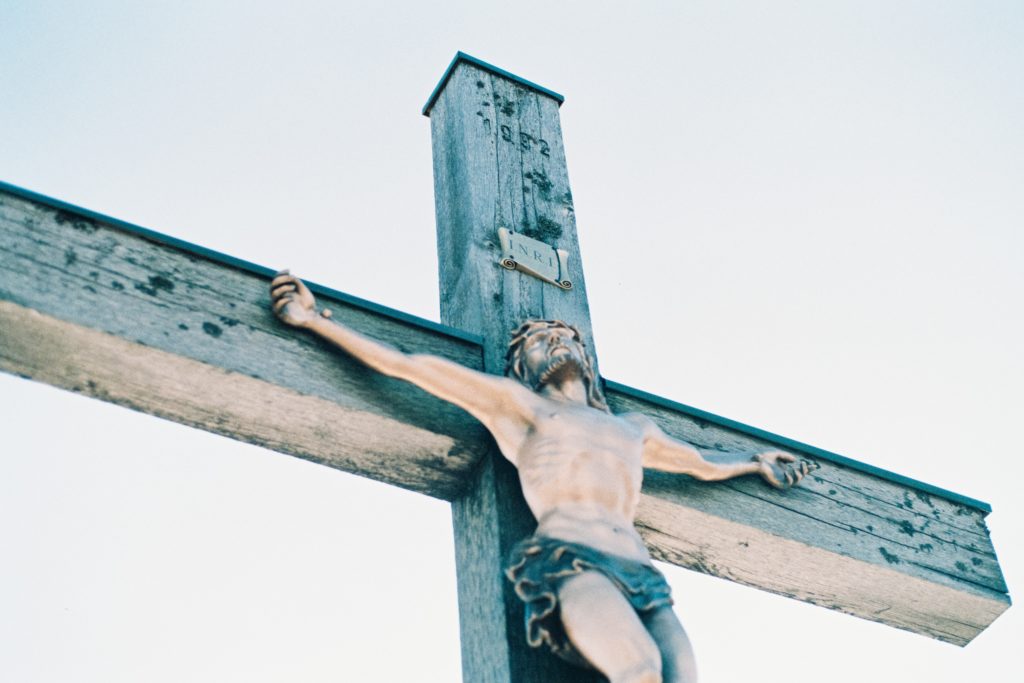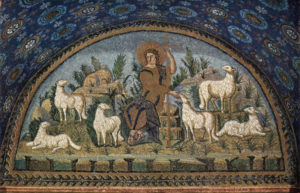
4th Sunday of Easter
St. John 10:11-18; Acts 4:5-12; Psalm 23; I John 3:16-24
In this first verse we have a promise. A promise that was so fulfilled that in the epistle reading St. John points to its fulfillment as an example for us to follow. The Good Shepherd has laid down His life for the sheep. He has laid down His life for us, his sheep, in order to change his body and blood into a sacrament for us and to satisfy the sheep he had redeemed with his own body as food.
Again, in the epistle reading, I’d like to focus on the word ought. “Hereby perceive we the love of God, because he laid down his life for us: and we ought to lay down our lives for the brethren.” We ought to follow his example. He first gave the example and now we are called to follow in it. To the same effect, St Augustin tells us it is written in a certain place. I believe it is Proverbs 23. “If thou sittest down to sup at a ruler’s table, make wise observation of what is set before thee; and put to thy hand, knowing that it will be thy duty to make similar provision in turn.1” By the rulers table, St. Augustin understands the Lord’s table or the Altar. You there find the body and blood of Christ. He admonishes us if we come to the Lord’s table we need to be ready to provide similarly i.e. we need to lay down our lives for others, yes physically but also in edifying others and in the maintenance of their faith. With this example St. Gregory the Great also encourages us, “The first thing that we are to do is to devote our external goods to His sheep in mercy. Then, if it should be necessary, we are to offer even our death for these same sheep….If someone does not give his substance to the sheep, how can we lay down his life for them?2”
In laying down His life, He did it of His own free will. He was not under compulsion but He chose to redeem us. In verse 18 He states, “I have power to lay it down, and I have power to take it again.” In this act, St. Basil tells us, “By His passion He made atonement for our evil passions, by His death He cured our death, by His tomb He robbed the tomb, by the nails that pierced His flesh He destroyed the foundations of hell.”3 His choice brought about such victory. His laying down of His life righted the world.
In another place St. Basil also says, “Death held sway until Christ died. The grave was bitter, our prison was indestructible, until the Shepherd went down and brought to his sheep confined there the good news of their release. His appearance among them gave them a pledge of their resurrection4” Two weeks ago, as per the readings, in the lectionary, we were looking at Jesus appearing to the disciples and later to Thomas, He gave his body to be physically examined by them so that for all generations we can be assured that his physical body resurrected. “and called them to a new life beyond the grave, ‘A good shepherd lays down his life for the sheep.’ and so seeks to win their love.5”

In the Psalm reading, we see that under the shepherd’s care there is no lack. He leads us where there is enough to eat and drink. In this place of safety, St. Chrysostom encourages us to remain. “…let us remain pasturing beneath this Shepherd: and we shall remain, if we obey him, if we hear His voice, if we follow not a stranger…If thus we do, we shall remain beneath the Shepherd, and the wolf will not be able to come in: or if he come[s] against us, he will do so to his own hurt.6”
In the protection of the Shepherd there is safety, however under the care of the hired hand or hireling there is not. Who is the hired hand and how do we recognise him? The fathers are agreed on this point, the hireling is the one who seeks his own interests. The Shepherd always seeks the interests of the sheep neglecting his own.
We have many examples of this through history for example: St. Paul in Ephesus desired to go before those who were causing the riot, but the disciples prevented him. His concern was for those in his care for his travel companions were brought before the magistrate. We may also remember Pope Leo I who met with the Huns to intercede for the people of Rome putting his life on the line in meeting with Attila. Many more examples could be presented, but we will leave it there for this Homily.
The hireling offers no protection as St. Gregory the Great so nicely elaborates, “Souls are perishing, and [the hireling] enjoys earthly advantages. The wolf snatches and scatters the sheep when he entices one to drunkenness, inflames another with greed exalts another by pride, destroys another by anger, stirs one up to envy, trips up another by deceit. When the devil slays believers through temptations, he is like a wolf dispersing the flock. No zeal rouses the hireling against these temptations, love excites him. He seeks only the outward advantages and carelessly allows the inward injury to his flock.7” While he offers no protection, the voice of the Shepherd still speaks through him.
St. Augustin goes so far as to say that the hirelings are needful. “But give heed to the fact that even the hirelings are needful. For many indeed in the Church are following after profit, and yet preach Christ, and through them is heard the voice of Christ, and the sheep follow, not the hireling, but the Shepherds voice speaking through the hireling.8” Why are they needful? As we know, there is a disparity between the needed amount of shepherds and true shepherds. The hirelings while they do not offer protection, may offer sound teaching. It is our responsibility however to pray that God would raise up the needed leaders who will care for his people above their own needs.
Verse 11, “I am the good shepherd: the good shepherd giveth his life for the sheep.” is set in opposition to two types of spoilers in this passage. We have the wolf who kills and destroys and the hired man who doesn’t prevent these things or gives his attention when they do happen. Christ promises and, as we know, laid down his life for the sheep (us) and will never desert us. He repeats the essence of this statement in verse 15, “I lay down my life”. St Chrysostom points that this is a proof that He is not a deceiver. He fulfilled what He said. Jesus promises and He will deliver. Chrysostom continues, “So also the Apostle [Paul], when he desired to show that he was a genuine teacher…established his authority by his dangers and deaths, saying, ‘In stripes above measure, in deaths oft’ II Cor 11:23. For to say, ‘I am light,’ and ‘I am life’ seemed to them a foolish [and] a matter of pride; but to say, ‘I am willing to die,’ admitted not any malice or envy.9” The proof of our teaching is whether we are ready to die for it. It is not whether we can win an argument or impress people with our intellect. It is whether when the chips are down will we stand by our words.

In verse 16 Jesus states, “And other sheep I have, which are not of this fold: them also I must bring, and they shall hear my voice; and there shall be one fold, and one shepherd.” However, in another place He says, “I am not sent but unto the lost sheep of the house of Israel,” and he revealed his bodily presence in the land of Palestine but to the Gentiles—He sent others. Have we then not heard His voice?
St. Augustin makes reply on this point. “But perhaps some one thinks that, as He Himself came not to us, but sent, we have not heard His own voice, but only the voice of those whom He sent. Far from it: let such a thought be banished from your hearts; for He Himself was in those whom He sent. Listen to Paul himself whom He sent; for Paul was especially sent to the Gentiles; and it is Paul who, terrifying them not with himself but with Him, says, ‘Do ye wish to receive a proof of Him who speaketh in me, that is, of Christ? II Corinthians 13:310’” According to this testimony, Christ Himself was in Paul speaking.
Having removed this possible doubt let us take a close look at verse 16. Another one of the Fathers, Theodore of Mosuestia states, “This sentence alludes to those among the Gentiles who will believe because many among the Gentiles as well as many among the Jews are destined to gather together into a single church and to acknowledge one shepherd and one lord, who is Christ. This has indeed actually happened.11” We also know this has happened because of the testimony of St. Paul in Ephesians chapter 2 verses 11-22,
“Therefore, remember that at one time you, Gentiles in the flesh, called the uncircumcision by those called the circumcision, which is done in the flesh by human hands, were at that time without Christ, alienated from the community of Israel and strangers to the covenants of promise, without hope and without God in the world. But now in Christ Jesus you who once were far off have become near by the blood of Christ.
For he is our peace, he who made both one and broke down the dividing wall of enmity, through his flesh, abolishing the law with its commandments and legal claims, that he might create in himself one new person in place of the two, thus establishing peace, and might reconcile both with God, in one body, through the cross, putting that enmity to death by it. He came and preached peace to you who were far off and peace to those who were near, for through him we both have access in one Spirit to the Father.
So then you are no longer strangers and sojourners, but you are fellow citizens with the holy ones and members of the household of God, built upon the foundation of the apostles and prophets, with Christ Jesus himself as the capstone. Through him the whole structure is held together and grows into a temple sacred in the Lord; in him you also are being built together into a dwelling place of God in the Spirit.”
Jesus then says, “No man taketh it from me,”. Let us hear St. Chrysostom’s explanation of this statement. “But if this be true, the next point is also certain, that He can ‘take it again’ when He will. For if the dying was a greater thing than men could do, doubt no more about the other. Since the fact that He alone was able to let go, His life shows that He able by the same power to take it again. [Do you see] from the first He proved the second, and from His death showed that His resurrection was indisputable.12”
In conclusion, what is there that we can take from this for us. First, let us lay down our lives for our brethren and if we can’t do that let us begin by showing mercy and compassion to their physical needs. Secondly, let us be bold in prayer, having the assurance that He hears us. Thirdly, when we see a hireling, let us not counter his teaching because it is the Shepherd’s voice, but let us attempt to protect the flock. When the hireling flees let us see how we can offer consolation to the flock left behind. Fourthly and finally, there are other sheep that are still outside the fold. Let us seek how we can most effectively be part of bringing them in.
~ Dn. Fr. Matthew
1 Philip Schaff, D.D., LL.D Editor, Nicene and Post-Nicene Fathers, First Series Volume 7, Augustin: Gospel of John, First Epistle of John, Soliloquies, originally published in the United States by the Christian Literature Publishing Company, 1888 (Peabody, MA: Hendrickoson Publishing Marketing, LLC), 260
2 Joel C. Elowsky and Thomas C. Oden Editors, Ancient Christian Commentary on Scripture New Testament IVa (Downers Grove, IL: InterVarsity Press, 2006), 345
3 ibid
4 ibid
5 ibid
6 Philip Schaff, D.D., LL.D Editor, Nicene and Post-Nicene Fathers, First Series Volume 14, Chrysostom: Homilies on the Gospel of St. John, Hebrews, originally published in the United States by the Christian Literature Publishing Company, 1888 (Peabody, MA: Hendrickoson Publishing Marketing, LLC), 215
7 Joel C. Elowsky and Thomas C. Oden Editors, Ancient Christian Commentary on Scripture New Testament IVa (Downers Grove, IL: InterVarsity Press, 2006), 346-347
8 Philip Schaff, D.D., LL.D Editor, Nicene and Post-Nicene Fathers, First Series Volume 7, Augustin: Gospel of John, First Epistle of John, Soliloquies, originally published in the United States by the Christian Literature Publishing Company, 1888 (Peabody, MA: Hendrickoson Publishing Marketing, LLC), 258
9 Philip Schaff, D.D., LL.D Editor, Nicene and Post-Nicene Fathers, First Series Volume 14, Chrysostom: Homilies on the Gospel of St. John, Hebrews, originally published in the United States by the Christian Literature Publishing Company, 1888 (Peabody, MA: Hendrickoson Publishing Marketing, LLC), 217
10 Philip Schaff, D.D., LL.D Editor, Nicene and Post-Nicene Fathers, First Series Volume 7, Augustin: Gospel of John, First Epistle of John, Soliloquies, originally published in the United States by the Christian Literature Publishing Company, 1888 (Peabody, MA: Hendrickoson Publishing Marketing, LLC), 262
11 Joel C. Elowsky and Thomas C. Oden Editors, Ancient Christian Commentary on Scripture New Testament IVa (Downers Grove, IL: InterVarsity Press, 2006), 350-351
12 Philip Schaff, D.D., LL.D Editor, Nicene and Post-Nicene Fathers, First Series Volume 14, Chrysostom: Homilies on the Gospel of St. John, Hebrews, originally published in the United States by the Christian Literature Publishing Company, 1888 (Peabody, MA: Hendrickoson Publishing Marketing, LLC), 218
Shepherd Photo by Michael O’Sullivan on Unsplash
Cross Photo by Christoph Schmid on Unsplash
Christ the Good Shepherd, from Art in the Christian Tradition, a project of the Vanderbilt Divinity Library, Nashville, TN.http://diglib.library.vanderbilt.edu/act-imagelink.pl?RC=51106 [retrieved September 14, 2018]. Original source: Wikimedia Commons.